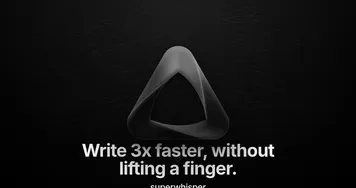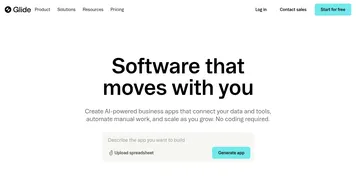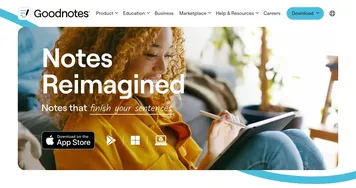ThetaWave
ThetaWave is a fancy AI tool that never forgets a lecture detail. Built for college students, it takes the chaos of class recordings, YouTube videos, PDFs, and raw text and spins them into neatly organized notes. It’s not just transcription — it’s a full-on study overhaul, complete with mind maps, quizzes, and flashcards. Imagine sitting in a lecture, your professor rattling off equations at warp speed, and ThetaWave quietly capturing every word, turning it into a formatted masterpiece with tables and diagrams. It’s the kind of thing that makes you wonder how you survived college without it.
The magic lies in its real-time transcription feature. Record a lecture, and ThetaWave churns out structured notes faster than you can scribble. It handles complex formats — think mathematical formulas or data tables — with surprising finesse. Beyond notes, it generates quizzes to test your knowledge and flashcards for quick reviews. There’s even an interactive chatbot that digs into your notes to explain tricky concepts, quoting directly from your materials. I think it’s a game-changer for anyone juggling multiple courses, especially in STEM fields where details pile up fast. The cross-platform syncing means you can study on your phone, laptop, or tablet without missing a beat.
But it’s not all smooth sailing. The tool’s still in beta, so occasional hiccups — like sluggish processing for large files — can pop up. Some users might find the interface a bit cluttered, especially when toggling between features like mind maps and quizzes. Compared to competitors like Youlearn or Mindgrasp, ThetaWave stands out for its all-in-one approach, but it lacks the polished simplicity of AudioNotes. Youlearn, for instance, excels at active recall with its flashcard focus, while Mindgrasp leans hard into summarization. ThetaWave tries to do it all, which is both its strength and its occasional stumble.
What surprised me? The podcast feature. Upload a lecture, and ThetaWave can turn it into a narrated audio summary — perfect for cramming during a commute. It’s not flawless; the AI voice can feel robotic at times, but it’s a clever touch. The collaborative sharing feature also caught my eye. You can share notes with classmates instantly, making group study sessions a breeze. Pricing isn’t public yet, but whispers on forums suggest it’ll be competitive with tools like AudioNotes, likely offering a freemium model with premium tiers for heavy users.
Still, ThetaWave’s ambition can be its Achilles’ heel. The sheer number of features might overwhelm users who just want quick transcriptions. And while it supports YouTube videos, it struggles with low-quality audio, so don’t expect miracles from that grainy lecture recording. If you’re a student who thrives on structure and interactivity, this tool’s worth a spin. Try starting with a single lecture to test its transcription chops, and experiment with the quiz generator to see if it fits your study style. Keep an eye on updates as the beta evolves — this one’s got potential to reshape how you tackle academics.
Video Overview ▶️
What are the key features? ⭐
- Real-Time Transcription: Captures live lecture audio and converts it into structured notes.
- Test Prediction Quizzes: Generates practice quizzes to test understanding of lecture content.
- Automatic Flashcards: Creates flashcards from notes for efficient review sessions.
- Mind Map Generator: Visually organizes concepts into interactive mind maps.
- Podcast Generator: Turns notes into narrated audio summaries for on-the-go study.
Who is it for? 🤔
Examples of what you can use it for 💭
- STEM Student: Converts complex lecture recordings with equations into formatted notes and diagrams.
- Commuting Student: Uses podcast summaries to review notes during daily commutes.
- Group Study Leader: Shares organized notes with classmates for collaborative exam prep.
- Visual Learner: Creates mind maps from lecture content to visualize key concepts.
- Busy Student: Generates flashcards from notes for quick review between classes.
Pros & Cons ⚖️
- Organizes lectures into clear notes
- Generates quizzes and flashcards
- Syncs across all devices
- Beta version may have bugs
- Cluttered interface at times
FAQs 💬
Related tools ↙️
-
 PortfolioPilot
Improve your investing with portfolio monitoring, macro analysis, and personalized recommendations
PortfolioPilot
Improve your investing with portfolio monitoring, macro analysis, and personalized recommendations
-
 Superwhisper
An AI tool that allows users to effortlessly dictate notes, emails, and documents
Superwhisper
An AI tool that allows users to effortlessly dictate notes, emails, and documents
-
 Glide
Makes it easy to build and deploy custom apps your business needs, and the team will love
Glide
Makes it easy to build and deploy custom apps your business needs, and the team will love
-
 Goodnotes
Captures, organizes, and enhances handwritten and typed notes across devices
Goodnotes
Captures, organizes, and enhances handwritten and typed notes across devices
-
 HumbleWorth
Estimates domain name values using AI-driven analysis
HumbleWorth
Estimates domain name values using AI-driven analysis
-
 Frederick AI
Streamlines startup launches with AI-driven planning and collaboration tools
Frederick AI
Streamlines startup launches with AI-driven planning and collaboration tools

